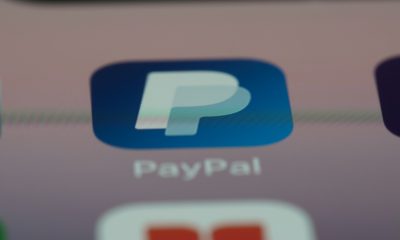Crypto
PayPal Continues to Bet on Cryptocurrency
After previously having launched its own stablecoin back in 2023, the U.S. fintech giant PayPal has now set its sights on the introduction of a new feature to its payments platform, which will be called “Pay with Crypto.” With the imminent launch of this new payments feature, businesses based in the United States will now be able to receive payments in cryptocurrency from international customers.

PayPal is doubling down on its commitment to cryptocurrency. In the coming weeks, businesses based in the United States will gain the ability to receive payments in digital currencies. The fintech company has officially announced the upcoming launch of a new service called “Pay with Crypto.” The goal of this initiative is to enable U.S. companies to accept crypto payments from international customers, while benefiting from reduced transaction fees and faster processing times — potentially completing transfers almost instantly, even when conducted across borders.
“Picture a customer in Guatemala who makes an online purchase — let’s say a gift — from a small local shop based in Oklahoma City,” explains Alex Chriss, the CEO of PayPal, in a press release issued last week to accompany the announcement.
“Thanks to PayPal’s platform,” he continues, “that small shop can now accept cryptocurrencies as a form of payment, pay significantly lower transaction fees than traditional methods, receive funds nearly in real-time, and even earn interest on the funds held in the form of PYUSD.” PYUSD is the company’s own dollar-pegged stablecoin, first introduced by PayPal in 2023 as part of its broader crypto strategy.
PayPal Tapping into a Base of Over 650 Million Crypto Users
According to figures provided by the company, this new functionality is expected to cover around 90% of the entire cryptocurrency market — representing more than $3 trillion in total value. The feature will also allow users to convert cryptocurrencies instantly, either into stablecoins like PYUSD or directly into fiat currencies such as U.S. dollars, depending on their needs.
More than 100 different cryptocurrencies — including major names like Bitcoin, Ethereum, and Solana — will be supported, along with widely used crypto wallets such as Coinbase and MetaMask. “This solution not only broadens revenue-generating possibilities for merchants,” the company emphasizes, “but also opens the door to a global user base of over 650 million active crypto users.”
This move represents the latest step in PayPal’s growing involvement in the cryptocurrency space. The company, which serves approximately 400 million users worldwide, first entered the crypto arena back in 2021. At that time, it became one of the first mainstream payment platforms to allow users to convert their cryptocurrency holdings into fiat currency in order to make purchases with merchants partnered with PayPal.
In addition, PayPal maintains a strategic partnership with Coinbase, one of the largest platforms for buying, storing, and managing cryptocurrencies. This agreement enables PayPal users to avoid trading fees when transacting with PYUSD, adding another incentive to adopt the stablecoin for payments and transfers.
Cutting 9% of Workforce Amid Restructuring
The introduction of this new product is emblematic of PayPal’s broader strategic pivot toward innovation, especially as the company seeks to revitalize growth following a challenging period. In 2024, PayPal faced headwinds on multiple fronts — including rising interest rates and a noticeable slowdown in consumer spending — both of which contributed to weaker performance in the digital payments sector.
At the same time, the company has been feeling the pressure of fierce competition from both fellow fintech firms and technology giants like Apple and Google, which are aggressively expanding their own payment solutions. In response, PayPal announced last year that it would be cutting approximately 9% of its global workforce, which amounted to just under 2,500 jobs being eliminated as part of a cost-reduction plan.
Despite the turbulence, PayPal reported total revenues of $8.29 billion for the year 2024 — a 5% increase compared to the previous year. However, the number of individual transactions processed through its platform actually fell by 5%, dropping to 6.2 billion — a decline that highlights the broader challenges in the digital payments space.
PayPal Entering a Highly Competitive Crypto Arena
Although PayPal’s latest push into crypto demonstrates boldness and vision, it is by no means operating in a vacuum. The company faces significant competition from both traditional financial institutions and emerging fintech startups, many of whom are rapidly rolling out their own crypto-focused services — particularly with policy tailwinds from the Trump administration, which has adopted a more crypto-friendly stance.
“In a market as exuberant and fast-moving as this one, there’s a real risk that executives and investors — caught up in the excitement — may overlook the early warning signs of an impending correction or downturn,” cautions Romain Liquard, an economist and specialist with Crédit Agricole’s research division.
Meanwhile, PayPal will be coming up against other major players are making their own aggressive moves. Circle — the most prominent challenger to Tether in the stablecoin space — recently launched the “Circle Payment Network,” a system aimed at streamlining cross-border payments by leveraging the efficiency of stablecoins.
Even the titans of traditional finance are getting involved. Last July, JP Morgan, one of the largest investment banks in the United States, took a significant step by beginning to offer credit backed by cryptocurrency collateral — marking a notable shift in institutional attitudes toward crypto-backed lending.
__
(Featured image by appshunter.io via Unsplash)
DISCLAIMER: This article was written by a third party contributor and does not reflect the opinion of Born2Invest, its management, staff or its associates. Please review our disclaimer for more information.
This article may include forward-looking statements. These forward-looking statements generally are identified by the words “believe,” “project,” “estimate,” “become,” “plan,” “will,” and similar expressions. These forward-looking statements involve known and unknown risks as well as uncertainties, including those discussed in the following cautionary statements and elsewhere in this article and on this site. Although the Company may believe that its expectations are based on reasonable assumptions, the actual results that the Company may achieve may differ materially from any forward-looking statements, which reflect the opinions of the management of the Company only as of the date hereof. Additionally, please make sure to read these important disclosures.
First published in Les Echos. A third-party contributor translated and adapted the article from the original. In case of discrepancy, the original will prevail.
Although we made reasonable efforts to provide accurate translations, some parts may be incorrect. Born2Invest assumes no responsibility for errors, omissions or ambiguities in the translations provided on this website. Any person or entity relying on translated content does so at their own risk. Born2Invest is not responsible for losses caused by such reliance on the accuracy or reliability of translated information. If you wish to report an error or inaccuracy in the translation, we encourage you to contact us

-

 Fintech1 week ago
Fintech1 week agoRuvo Raises $4.6M to Power Crypto-Pix Remittances Between Brazil and the U.S.
-

 Biotech5 days ago
Biotech5 days agoEurope’s Biopharma at a Crossroads: Urgent Reforms Needed to Restore Global Competitiveness
-

 Crowdfunding2 weeks ago
Crowdfunding2 weeks agoAWOL Vision’s Aetherion Projectors Raise Millions on Kickstarter
-

 Africa1 day ago
Africa1 day agoFrance and Morocco Sign Agreements to Boost Business Mobility and Investment
























